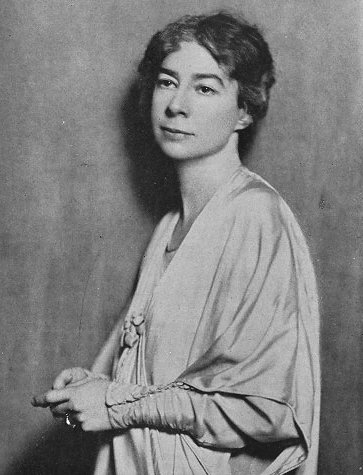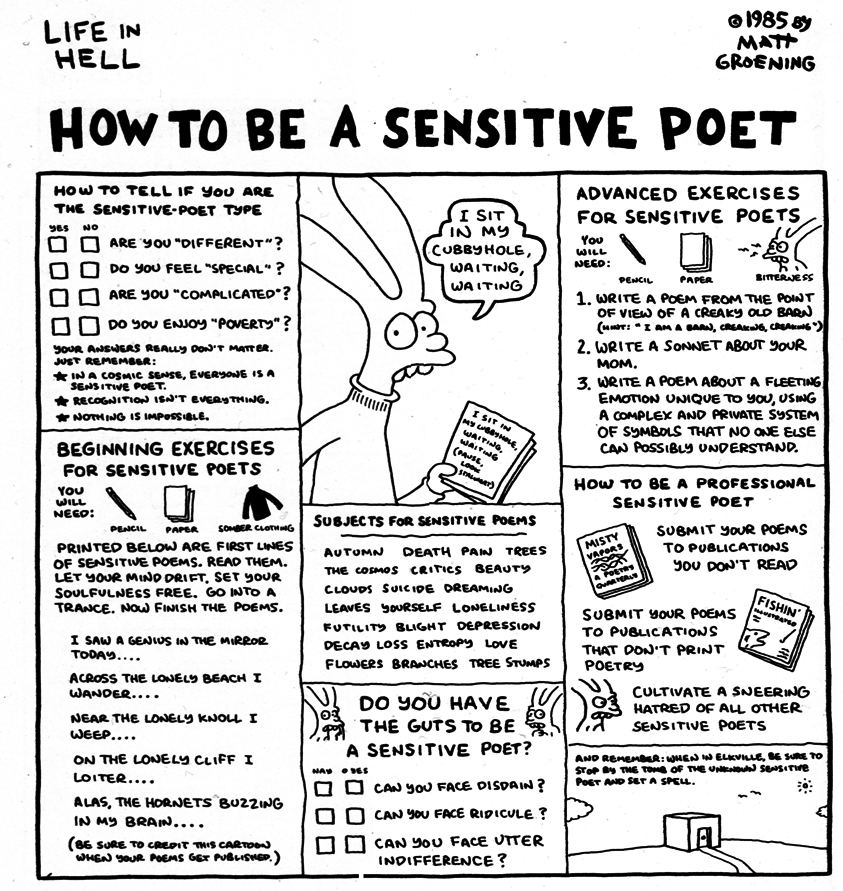
SO we have established the early 20th century Modernists were “impure”—to the consternation of the Romantic and Victorian “purists.”
We have established this truism—with the help of Pulitzer Prize winning Robert Penn Warren, Southern Agrarian, New Critic, author of the essay published in John Crowe Ransom’s Kenyon Review, “Pure and Impure Poetry.”
Warren was also co-author of the 20th century textbook Understanding Poetry— whose four editions dominated pedagogy for more than half of the last century, with the last fifty years seeing no change to that legacy except that no one talks about New Criticism, even though that is still what we are doing.
What is New Criticism? It’s nothing. It’s just a kind of vacant, rambling, dumbing-down, with half-finished arguments of the “proof of the pudding is in the eating” variety. New Criticism (and this will save you a lot of time) is empty discursiveness— with cynical gestures inserted towards “grounding in the text”—and this was, and is, the whole point of New Criticism. There’s no rationale or philosophy to it. It’s smoke, not fire.
The textbook, Understanding Poetry greeted every GI Bill recipient who went to college to learn poetry—when the arts changed forever and modern art became “establishment” after WW II. As recently as the 1930s, the American public looked at modern art and said “what is this crap?” as they were still admiring the sonnets of Edna St. Vincent Millay and reading Plato and Keats in school.
The following has also been established: there is nothing different about the Modernist clique of Ezra Pound, H.D., and William Carlos Williams (who all happened to be college buddies and ripped off Haiku as “radical” Imagistes in the early 20th century) and the New Critics—these two groups were allies, who saw the world in the same, opportunistic, unsentimental and impure manner. This is proven by the New Critic textbook Understanding Poetry’s explicit praise of Williams’ Red Wheelbarrow and Pound’s “In A Station at the Metro” and its trashing of Poe’s “Ulalume” with its purist rhyming. The first edition of Understanding Poetry launched in the 1930s—when “conservatives,” “purists,” and the vast majority of the American public, were still resisting the “new impure art.” The New Critics, despite paying lip service to Tennyson and Shakespeare, were fully on board with the “experiments” of Williams and Pound.
The next wave of the avant-garde, it is also established, the one associated with The New American Poetry 1945-1960, belongs entirely to the Williams/Pound sensibility of impurity—a seamless extension of what Pound was doing 50 years earlier and which the New Critics explicitly supported. The Red Wheelbarrow chapter in Understanding Poetry, which praises that poem as a “fresh” way of seeing, akin to looking through a “pin prick in a piece of cardboard” is similar to Charles Olson’s “field” theory reproduced in the New American Poetry 1945-1960. Louis Ginsberg, the poet who frequented nudist camps, belonged to the same social circles as William Carlos Williams, and it is well known that Williams and Louis’s son, Allen Ginsberg, mutually admired one another. New Critic John Crowe Ransom was known to be squeamish about homosexuality. Aesthetically, however, the Modernists of the early 20th century (the ones who hated Edna St. Vincent Millay), the New Critics, and the Olson/Duncan/Creeley/Ginsberg clique were one and the same, a bunch of very white, very male, “radicals,” whose code word, as articulated, by Robert Penn Warren, was “impurity,” in opposition to all that was aesthetically “pure,” i.e., uptight and old.
The cool kids went for the “impure,” obviously; the “pure” was easily mocked as prudish, small-minded, timid, and old-fashioned. It was no contest. No wonder the landscape shifted in a few short years. Both the “radical” Modernists and the “conservative” New Critics were hip to the Red Wheelbarrow, and naturally the “new” was knocking on the door.
That “door” happened to be this—and this sealed the deal. Paul Engle hired Robert Lowell (who left Harvard to study with John Crowe Ransom) to teach in his Writing Workshop. The Writing Program at Iowa (and soon the Creative Writing model would find a home everywhere) welcomed the “new” not just aesthetically, not just pedagogically, but practically. You, new poet, will be paid to teach the new, and we will get rid of all those professors teaching nothing but the old. You will be paid to be new. The new is guided by the New Criticism, which means the “new” can be whatever you want it to be. As long as you can get the academic, professional, New Critic patter down, the world is yours. There’s no need to be creative. And just like touring (1969—present) made the Rolling Stones rich, once they established their catalog (mostly 1965 to 1969) the template of Modernism (1913 to 1962) is all you need.
The door opened. Modernism has swept the field. Byron is in the bin.
Conservatives today, who complain, are ridiculed. “Go home, purists! This is our game, now.”
The New Critics are rejected as “conservatives” today, but this “rejection” is just because the New Critics only seemed to be conservatives in order to lead the radicals into the middle of the camp. If one calmly reads “Pure and Impure Poetry” and sees what that sensibility really is, or reads chapter after chapter of Understanding Poetry and its scattered inanities, chirping bright nonsense, like a car salesman’s pitch, one will get it. Here’s an old fart, a crackpot, winning the day by abetting the kids.
No one dares to defend “purity.” It’s so much easier to defend “impurity,” which is too cool to mock.
Even the “conservatives” today are helpless to resist. Dana Gioia finds the Red Wheelbarrow “scans” exactly like “To Be or Not To Be.” Unable to escape the maze of: Red-Wheelbarrow-approved-by-the-New-Critics, the dead white male, WC Williams is pathetically brought in by Gioia for the sake of the conservative cause. Williams is really Shakespeare!
William Logan, another “conservative,” astute enough to lampoon bad modern poets in his many brilliant reviews, rates Pound high above Shelley.
But this is how much radicalism has triumphed in poetry. All the conservative can do is read purist masterpieces in private. The public square belongs to the radical.
Even this “conservative” has been fooled. I am as guilty as the rest. I fell into Robert Penn Warren’s deception by using his terminology: “pure and Impure.”
I did so in this essay—the “pure/impure,” half-truth, fraud (“a little learning is a dangerous thing”) is now established coinage.
I defended the “pure” against the “impure.” Sucker!
For truly, it is Modernism, it is the Red Wheelbarrow, which is “pure.”
The Raven is a thousand times more “impure” than white petals on a black bough. One has diverse elements in service to something, the other has diverse elements in service to—nothing.
Prometheus Unbound by Shelley and Don Juan by Byron are extremely “impure.”
The theories of Pound and Olson, the aesthetic ideas of the New Critics, are “pure.” Pure bullshit. Olson is a bigger crackpot than Pound—and Pound failed as a pedagogue: the “musical phrase” arises out of a metronome (even Mozart used one) and talent, not because Ezra Pound demands it. And what does “make it new” even mean? What is “it?” Does Pound want originality? That’s not a new desire.
Poe said: The senses sometimes see too little, but they always see too much.
So yes, the impressionist symbolism of the Romantic narrows and “purifies” to a certain extent—which is what the Red Wheelbarrow was pathetically attempting.
Too much “purity” and narrowing finally leads to the death of poetry, just as too much expanding “impurity” does.
Purity and Impurity are stupid terms, finally, just as the Raw and the Cooked, are. We need to stop falling for this crap.
The only escape is a radical calling out of all the bullshit which for the last hundred years or so has hindered us—as we look at the past again, without selling it out in the name of the trendy new and its manifesto short-cuts. A hundred years is not that long, and the pertinent texts are relatively few. This doesn’t have to be overwhelming. We can do this.
And no one has to be a big baby about this, either. No one is saying we can’t also have our cakes and ale, our eclectic likes and dislikes, our politics, our sense of social justice, in every sense, as we call out the bullshit. No one is saying “the old is good and the new is bad,” or any such “pure/impure” nonsense. The only thing is: the bullshit will be called out.
Scarriet Editors
July 13, 2022

















